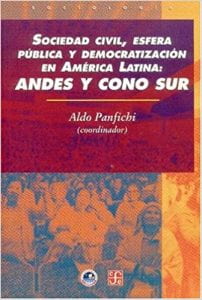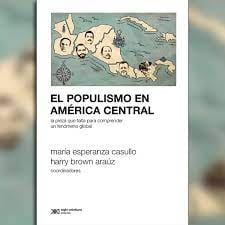A Review of Sociedad Civil, Esfera Pública y Democratización en América Latina: Andes y Cono Sur
Civil Society: Facing New Challenges

Sociedad Civil, Esfera Pública y Democratización en América Latina: Andes y Cono Sur Edited by Aldo Panfichi Pontificia Universidad Católica del Perú Fondo de Cultura Economica, Mexico 2002, 655 pages
A civil society in Argentina, Chile, Colombia and Peru has contributed to democratic governance over the last two decades. Relations between civil society and State in this region are complex. In this edited volume, Peruvian sociologist Aldo Panfichi has set out to examine such diverse actors as unions and professional associations, human rights groups, environmental groups, corporate foundations, feminists and low income women’s organizations.
The book, part of a three-volume series including Mexico and Brazil, stems from a worldwide research project directed by the University of Sussex’s Institute of Development Studies and funded by the Ford Foundation. Project participants share the conviction that the social sciences in the southern hemisphere need to focus more closely on the social and political dynamics within civil society.
The 23 authors—senior scholars and promising younger researchers—in this 19-chapter volume share a minimum definition of the concept of civil society, while recognizing the difficulty of applying it in practice. They also recognize the normative value of the concept, sharing the conviction that democracy is much more than periodical elections and involves an active participation in the public sphere. From these common starting points, the authors exercise broad freedom in highlighting the ways in which diverse processes—social, political, economic, cultural—imprint the collective actions and organizational dynamics in each country.
Four national overview chapters (by Argentine sociologist Enrique Peruzzotti, Chilean civil society specialist Gonzalo de la Maza, and political scientists Mauricio Romero from Colombia and Farid Kahhat from Mexico) make evident that diverse national experiences lead to different maps of civil society and different paths of civil society action. However, as Panfichi points out in his introductory piece, common themes allow for a comparative analysis of the cases involved.
One common theme involves the impact of the last two decades’ economic reforms on the mobilization and organizational capacity of civil society. Authors in this volume, to varying degrees, share the view that free market reforms have only exacerbated poverty and inequality, factors that in turn impede the consolidation of democracy. Several chapters stress that much-affected labor unions have been the actors most profoundly weakened by the move away from statist economies. In this respect, I believe the book properly shows the tension between recent economic reforms and the interest of diverse civil society groups in defending Latin America’s precarious welfare states, which are gradually being reduced in the name of international competitiveness. Yet despite general enchantment, there is also recognition that the social policies of the 1960s and 1970s were also ineffective at overcoming poverty and increasing social inclusion; “answers” developed by critics of today’s reforms smell distinctly like the old recipes.
The book is crossed by this tension: that the egalitarian policies, the basis of the welfare democracy the authors believe in, are limited by the necessity to maintain competitiveness in the international sphere. How to obtain enough economic growth to maintain a welfare state that will reduce inequality seems to be the question that Latin Americans want their politicians to answer.
Various authors also analyze how regional human rights organizations have recently shifted from their traditional interests in defending civil and political liberties, towards an agenda focusing on social, economic and cultural issues—and on how to defend basic human rights against economic change. However, no consensus exists about the ways in which “control” over state action in these areas could be established. The chapter by Argentine lawyer Roberto Saba states well the need to make such criticisms more professional and technical in order to be effective (p. 174).
At the same time, the decision by civil society organizations to become more technical and professional can also be a problem. Civil society in these countries is far from homogeneous. To some degree, there is a “richer” civil society with considerable resources and comprised of largely middle class professionals, and a “poor” civil society formed by the poor themselves. Many of the examples presented in this book of successful institutions—in terms of their contribution to democracy—are part of the “richer” civil society. If we concentrate on the requirement of professionalization in order to gain access to the public sphere, a different kind of social exclusion may develop.
A related issue is the degree of autonomy that these institutions have in respect to the State. Although remaining “independent” is a problem for all organizations that in some way or another have relations with the State, again the challenge is far greater for those institutions comprised of citizens from lower classes. The extreme case seems to be Peru. Kahhat´s chapter shows the extreme vulnerability of organizations principally funded by the Peruvian state as they grapple with issues of politics and patronage.
Nonetheless, in the opinion of this commentator, the discussion about autonomy should not focus solely on the way in which such poor peoples’ organizations relate to the State. It fails to examine the autonomy of civil society organizations vis-à-vis other sources of finance, especially in the case of the NGO’s. An examination of how domestic public agendas may not always be constructed from within the countries, but conditioned by external aid, would have been an interesting addition to this otherwise thorough book.
The examination of feminism and human rights across these countries is both broad and deep. The four articles about feminist movements present a paradox: despite the generalization of diverse feminist demands in these societies, feminism remains weak as a political discourse. “Spontaneous feminism,” as sociologist María del Carmen Feijoo calls it (p.198), means that many young women now lead their lives in the public sphere according to feminist values and question traditional sexist practices. These women, internalizing aspects of the feminist agenda, are increasingly assuming positions of public prominence (including as ministers of defense and foreign affairs). Hence common sense may lead us to believe that the old feminist battles have been won.
However, the authors point to a loss of the ideological strength of the feminist movement, which weakens it as such. Furthermore, there are suspicions that the changes are not as profound as believed. The authors share the conviction that machismo is alive and well within society and defend the necessity of articulating diverse feminist voices in order to develop a more political agenda.
In the field of human rights, the authors show how violence has marked the processes of consolidation as well as the policies developed by human rights organizations in different contexts. Argentina and Chile, under military dictatorships, have birth to a strong group of organizations dedicated to the defense of basic liberties. For Colombia and Peru this occurred as a result of internal conflicts under civilian rule. All of these organizations have collaborated in the constitution of more plural and democratic societies, but their impact in the public sphere varies from country to country.
For Saba, for example, the environment of crisis and violence in which human rights groups developed in Argentina, and their own decisive actions, allowed society in general to initiate a difficult process of learning to build a more plural and deliberative society. The Chilean case is in some ways similar. According to Saba, because these organizations defend universal liberties and not sector-specific interests, they are more disposed to adopt a pluralistic position. These organizations had a key role in post-dictatorship transition processes in Argentina and Chile, and in the defense of life and rule of law in the context of internal armed conflict in Peru and Colombia. Each has contributed to the construction of a more egalitarian society, without which a democracy would not have strong legitimacy.
Finally, a word about our present. I believe that recent dramatic events taking place in the countries discussed in the book—and in others such as Bolivia—illustrate the pertinence of its publication. Whether responding to economic crisis in Argentina, bringing Lula to power in Brazil or carrying out a Truth Commission in Perú, civil society organizations have been fundamental agents of social and political change, and fundamental to the defense of democracies that are responsive to their citizens’ needs.
Spring 2004, Volume III, Number 3
Eduardo Dargent is a Peruvian lawyer with a MA in Political Philosophy from the University of York, UK. He was formerly a researcher for the Andean Commission of Jurists. He is now a researcher and lawyer for the Special State Attorney’s Office for the Fujimori-Montesinos case.
Related Articles
A Review of Born in Blood and Fire
The fourth edition of Born in Blood and Fire is a concise yet comprehensive account of the intriguing history of Latin America and will be followed this year by a fifth edition.
A Review of El populismo en América Latina. La pieza que falta para comprender un fenómeno global
In 1946, during a campaign event in Argentina, then-candidate for president Juan Domingo Perón formulated a slogan, “Braden or Perón,” with which he could effectively discredit his opponents and position himself as a defender of national dignity against a foreign power.
A Review of Aaron Copland in Latin America: Music and Cultural Politics
In Aaron Copland in Latin America: Music and Cultural Politics, Carol Hess provides a nuanced exploration of the Brooklyn-born composer and conductor Aaron Copland (1900–1990), who served as a cultural diplomat in Latin America during multiple tours.




